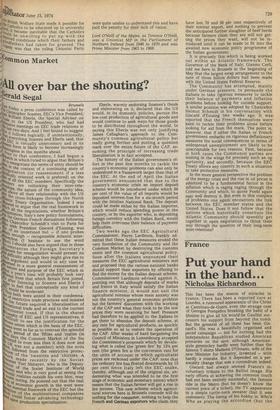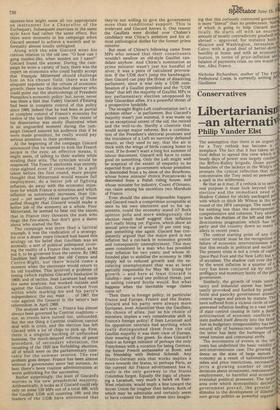France Put your hand in the hand...
Nicholas Richardson
This has been the season of miracles in France. There has been a reported cure at Lourdes, a rumoured appearance of the Christ at Castelnau-de-Guers, even the strange case of Georges Pompidou breaking the habit of a lifetime to give all his would-be Gaullist successors his support from beyond the tomb. But the greatest .of all these has been Giscard's. His was a beautifully organised and paced campaign — not for nothing had the Independent Republican studied American primaries on the spot, although Americanstyle gimmickry hardly went further than the famous T-shirts Madame D'Ornano, wife of the new Minister for Industry, invented — with hardly a mistake. But it depended on a personality change that was a conundrum indeed. Giscard had always seemed France's involuntary tribute to the Balliol image. His early efforts at achieving the common touch had not been entirely successful; the famous ride in the Metro (but he doesn't know the current price of a ticket), the TV appearance in a simple turtle-neck sweater (but it was cashmere). The listing of his hobby in Who's Who as playing the accordion (but the
squeeze-box might seem all too appropriate an instrument for a Chancellor of the Exchequer). Subsequent exercises in the same style have had rather the same effect. But there were moments in his campaign when Giscard seemed to achieve a warmth and informality almost totally unfeigned.
Along with the new Giscard went his curious relation to the old one. "0 how can I gang maiden-like, when maiden am I nane?"
Giscard found the answer. During the campaign he wore a variety of hats; there was the expert on economics who could hardly accept that Francois Mitterrand should challenge him on his chosen field; there was the eloquent exponent of the virtues of economic growth; there was the detached observer who could point out the shortcomings of President Pompidou's economic policy: but, never, never was there a hint that Valery Giscard d'Estaing had been in complete control of this policy since 1969, indeed that he had been in partial or complete control of France's economy for twelve of the last fifteen years. The extent of his dissociation was nicely illustrated when in an unguarded moment during the campaign Giscard assured his audience that if he were made president, he really would pay serious attention to their problems.
At the beginning of the campaign Giscard announced that he wanted to look the French peopie in the eyes; an effective means, it might seem, of talking to their wallets while stealing their wits. The cynicism would be misplaced. The French electorate was entirely clear-sighted even if cross-eyed. In a poll taken before the first round, more people thought that Mitterrand would ensure full employment, do a better job of fighting inflation, do away with the economic injustices for which France is notorious and which inflation as notoriously increases, than Giscard — yet nearly three quarters of those polled thought that Giscard would make a better job of the economy as a whole. Poor Mitterrand, he seemed to bear out the axiom, that in France they threaten the man who rings the fire-alarm. but don't give a damn about who started the fire.
The campaign was more than a tactical triumph, it was the vindication of a strategy. for over a dozen years Giscard had based this strategy on his belief that Gaullism was an anomaly, a sort of political palimpsest covering the reality of a France that wanted, as he put it, to be governed from the centre. By 1962 Gaullism had absorbed the old Centre and Centre-Right, but there would come a moment when the electorate would return to its old loyalties. This involved a problem of timing (which explains Giscard's hesitation in 1969) and of tactics. Jean Lacanuet had made the same analysis, but worked outside and against the Gaullists. Giscard worked from within while marking his and his party's independence; the oui, ma's . . . of 1967, the vote against the General in the latter's last referendum in April 1969.
The analysis isn't new — France has almost always been governed by Centrist coalitions — nor, as events have turned out, unfounded. But the one thing a Centrist coalition cannot deal with is crisis, and the election has left Giscard with a lot of chips to pick up. First, there is a singular backlog of unfinished business, the much-delayed reforms of penal procedure, of secondary education, the recasting of the 1920 law forbidding abortion, all of which were on the parliamentary timetable for the summer session. The real problem goes deeper. France has been almost without a government since last autumn. At best there's been routine administration at worst politicking for the succession. Rather surprisingly, the least of Giscard's worries is his new presidential majority. Arithmetically, it looks as if Giscard could rely only on some 120 MPs out of a total 490, with the Gaullist UDR still counting 180: and the leaders of the UDR have announced that they're not willing to give the government more than conditional support. This is irrelevant and Giscard knows it. One reason the Gaullists were divided over Chaban's candidacy was Chirac's ambition and his almost pathological dislike for the former prime minister.
But most of Chirac's following came from MPs who sensed that their constituents wouldn't swallow an old-style Gaullist can didate anyhow. And Chirac's nomination as prime minister wasn't just his handful of silver, it was a piece of calculated provocation. If the UDR don't jump the bandwagon, then Giscard can play the threat of dissolving parliament; since it was only a UDR combination of a Gaullist president and the "UDR State" that left the majority of Gaullist MPs in any parliamentary election unopposed by their Giscardian allies, it's a powerful threat of a prospective landslide.
The straight Right-Left confrontation isn't a problem either — in parliament. But Giscard's majority wasn't just minimal, it was made up to an exceptional extent of the old, the retired and the well-to-do. Hardly a clientele that would accept major reforms. But a combination of the President's electoral promises and the truculence of a Left so narrowly defeated means, as they used to say, that the air is thick with the wings of birds coming home to roost. If he doesn't want a long hot summer of labour discontent, Giscard will have to come good on something. Only the Left might well be sceptical of the extent of empathy to be expected from a government whose president is descended from a by-blow of the Bourbons, whose home minister Prince Poniatowski is descended from a Polish ruling,. house, and whose minister for industry, Count d'Ornano, can claim among his ancestors two Marshals of France.
Even should the almost impossible happen and Giscard reach a compromise acceptable at once to his own electorate and to his opponents, could the economy stand it? Both opinion polls and more ambiguously the election result itself suggest that inflation isn't really biting yet. Figures, which show an annual price-rise of around 15 per cent sug: gest something else again. Giscard has consistently argued that the major peril is not inflation but a cut-back in economic growth and consequently unemployment. This may seem consistent in a man who has presided over inflation for two years; and whose illfounded plan to stabilise the economy in 1963 simply led to reduced growth and the escalating unemployment that was at least partially responsible for May '68. Going for growth — and here at least Giscard is Gaullist— may avoid one political threat, just as sailing toward Scylla would. But what happens when the inevitable wage claims come in?
Then there is foreign policy, in particular France and Europe, France and the States. Giscard and his party were always more European, even Atlanticist than the Gaullists. His choice of allies, just as his choice of ministers, implies a very considerable shift in France's foreign policy; if Jean Lecanuet and his opposition centrists had anything which really distinguished them from the old Gaullist majority it was their view of Europe, their wearing of the green. So does Giscard's choice as foreign minister of perhaps the only Frenchman with a vocation for being German, the former French ambassador at Bonn, and his friendship with Helmut Schmidt. Any Franco-German axis that works implies a move towards the States, so perhaps Paris, as the current Air France advertisment has it, really is the only gateway to the States Columbus forgot. Equally the logic of choos ing a Lecanuet, very much a hawk on EastWest relations, would imply a line toward the Soviet Union far tougher than before. Both of which may be admirable and certainly seem to have conned the British press into imagin
ing that this curiously contoured govermn, is more "liberal" than its predecessor. Neal' of which is going to help Giscard dOnv tically. He starts off with an enorme amount of mostly contradictory goodwill ft abroad — approved, for instance both Moscow and Washington, Jerusalem a Cairo; with a good deal of better-direct hostility at home: and with an economic, tuation, in terms of price-inflation and balance of payments crisis, no one would eø him. Allez France.
Nicholas Richardson, author of The Fre Prefectoral Corps, is currently writing AP Gaullisme



































 Previous page
Previous page